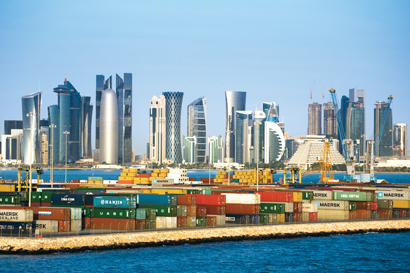Middle East corporates rationalise expenditure
In the context of consistently falling oil and gas prices in the international markets, regional corporates have taken a variety of approaches in preparation for slower growth in the coming years. Broadly speaking, these efforts have involved streamlining operational costs while simultaneously maintaining long-term capital spending, writes Oliver Cornock.
 In Qatar’s 2016 budget, which was released in December 2015, the government projected a QAR46.5 billion deficit – the nation’s first budget shortfall in a decade and a half. (Image Arabian Eye/ Corbis)
In Qatar’s 2016 budget, which was released in December 2015, the government projected a QAR46.5 billion deficit – the nation’s first budget shortfall in a decade and a half. (Image Arabian Eye/ Corbis)In mid-December 2015, Qatar’s Ministry of Development Planning and Statistics cut the country’s gross domestic product (GDP) forecast for the year to 3.7 percent, down by nearly half from an earlier prediction of 7.3 percent and the 6.1 percent recorded in 2014. At the same time, the ministry slashed its outlook for 2016 and 2017, to 4.3 percent and 3.7 percent respectively. These adjustments come after nearly two years of declining oil and gas prices. From June 2014 through January 2016 the price of Brent crude – the international oil benchmark – dropped from USD115 (QAR418.6) per barrel to less than USD30 (QAR109.2) per barrel, a fall of nearly 75 percent. Qatar, like many neighbouring energy-rich Gulf Cooperation Council (GCC) member states, has a sizeable fiscal buffer and is well positioned to borrow from local and foreign lenders alike.
Nonetheless, in recent years the country has taken action in preparation for a prolonged period of low energy prices. In Qatar’s 2016 budget, which was released in December 2015, the government projected a QAR46.5 billion deficit – the nation’s first budget shortfall in a decade and a half. “Not only this year, but for years to come, [Gulf] countries will need to make an adjustment to better balance their spending to the new reality of oil prices,” Masood Ahmed, the director of the International Monetary Fund’s Middle East and Central Asia department, told local media in late 2015.
As regional governments have moved to curtail spending, local corporates have not been immune to the impact, albeit to varying degrees depending on their respective economic sector. Oil and gas firms, for example, have been faced with clients seeking to renegotiate long-term contracts, in an effort to take advantage of lower market prices. Firms involved in oil-related activities have been the hardest hit, though Qatar’s liquefied natural gas (LNG) industry has not been immune to calls for lower pricing. Indeed, over the course of the past year, natural gas prices have fallen by nearly 35 percent due in large part to increased competition from US-based shale gas producers. According to a March 2015 study published by the Center on Global Energy Policy, a US-based research body affiliated with Columbia University, Qatar’s LNG revenues will likely plateau or decline further over the course of the coming decade.
Liquidity squeeze
In Qatar, both the financial and construction industries rely to a large degree on public sector deposits and contracts, respectively. As such, many of them are in the early stages of instituting belt-tightening policies. The banking sector, which reported a rapid withdrawal of government deposits in 2015, is currently in the early stages of what some have interpreted as a liquidity crunch. “There is clearly a squeeze on liquidity and some inertia in the system,” Robin Abraham, managing partner for the Middle East at the law firm Clifford Chance, told international media in December 2015.
The construction industry, meanwhile, has thus far remained relatively busy, thanks to the government’s continued investment in infrastructure in the run-up to host the 2022 World Cup. Still, local builders are keeping a close eye on the economy. “Government-related enterprises (GREs) may see borrowing costs rise and there must be a possibility that the increase in sovereign borrowing in some Gulf countries removes some liquidity that would otherwise find its way to the GREs,” said Abraham.
Regional corporates have taken a variety of approaches in preparation for slower growth in the coming years. Broadly speaking, these efforts have involved streamlining operational costs while simultaneously maintaining long-term capital spending. In 2015, for example, restructuring in Qatar’s energy sector resulted in numerous job cuts, with RasGas, Maersk Oil and others laying off hundreds of employees each. Qatar Petroleum, meanwhile, laid off an estimated 3000 workers in 2014 and 2015. “We are operating in a materially changed oil price environment and have taken necessary decisions to reduce activity levels through 2015, and ensure we focus where we can see adequate returns from our most robust projects,” Jakob Thomasen, the CEO of Maersk Oil, told local media in November 2015.
For many smaller companies, meanwhile, the new operating environment has encouraged additional investment in human resources, which tend to be these firms’ most valuable assets. “We are not laying people off,” Wim Roels, the CEO of Borouge, an Abu Dhabi-based energy firm, said to the media in late 2015. “We are just spending money wisely and being conservative in spending, but [we are] not going to jeopardise [the future],” he added.
Of course, many firms operating in Abu Dhabi, as in Qatar, have benefitted from more than a decade of strong economic growth and, as such, are relatively well situated to weather the current period of low oil prices.
Oliver Cornock is the managing editor for the Middle East, Oxford Business Group.
Like this story? Share it.






